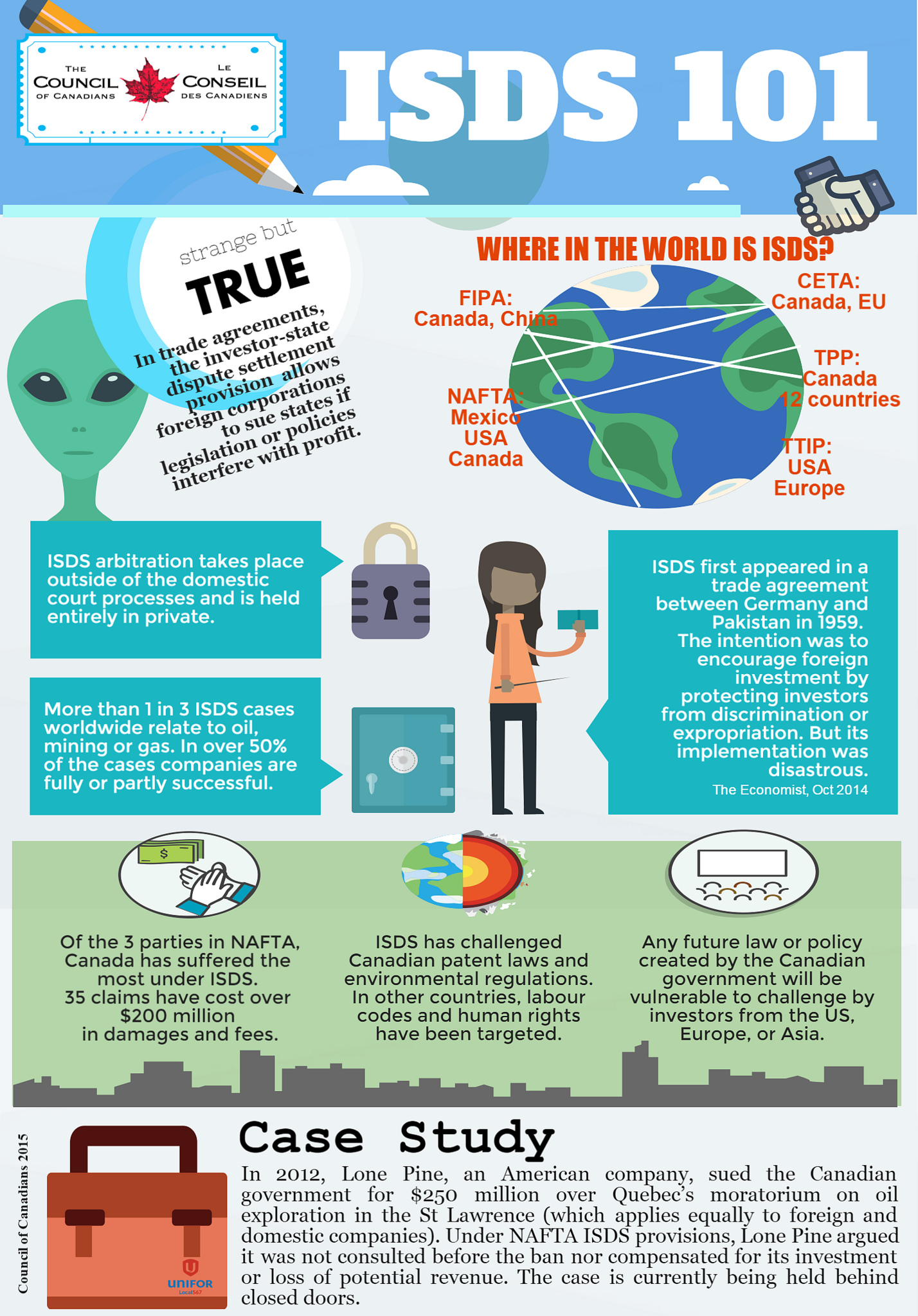Like this article? rabble is reader-supported journalism. Chip in to keep stories like these coming.
While the full text of the Trans-Pacific Partnership is not likely to be released until November 5 or later, we do know from various media reports that the 12-country agreement that encompasses more than 40 per cent of the global economy includes an investor-state dispute settlement (ISDS) provision.
In short, ISDS gives corporations the power to sue national governments for lost future profits related to public interest legislation, most commonly focused on the protection of the environment. This provision is known as Chapter 11 in the North American Free Trade Agreement (NAFTA) and it’s present in the yet to be ratified Canada-European Union Comprehensive Economic Trade Agreement (CETA) and is the subject of debate and proposals to reform in the United States-European Union Transatlantic Trade and Investment Partnership (TTIP).
As for the TPP agreement reached on October 5, Foreign Policy notes, “The final deal reportedly includes substantial changes to the investor-state process. A key change: Companies would have to prove all elements of their damages’ claims, which could effectively make it easier for tribunals to side with the states being sued. In addition, the new agreement would also ease the process of dismissing frivolous claims and enact rules preventing conflicts of interest among attorneys who hear cases.”
Toronto Star columnist Thomas Walkom writes, “The Canadian government says only that the new pact will establish ‘strong rules’ to treat foreign investors ‘in a fair, equitable and non-discriminatory manner.’ The U.S. government goes farther. It says the entire NAFTA dispute settlement process will be ‘upgraded’ to make it more difficult for corporations to make frivolous claims. In particular, according to the office of the U.S. trade representative, the TPP will not allow dispute settlement panels to overturn laws. Instead they will be limited to issuing what are, in effect, stiff fines.”
That said, Walkom cautions, “Ottawa says the TPP does not remove the right of governments to ‘legislate and regulate in the public interest.’ That’s what was said about NAFTA originally. But those claims proved to be false. With the TPP, as with NAFTA, all will depend on how the final text is worded and how the dispute settlement panels interpret this wording. In the end, the new Trans-Pacific deal is essentially a renegotiated NAFTA with Japan and a couple of cheap-labour countries (Vietnam, Malaysia) thrown in.”
Others have been more critical of the provision.
U.S. Congressman Peter DeFazio has suggested that the ISDS provision in TPP is worse than its equivalent in NAFTA.
And Friends of the Earth highlights, “The Investor State Dispute Settlement (ISDS) mechanism included in the TPP investment chapter grants foreign investors access to a secret tribunal if they believe actions taken by a government will affect their future profits. This provision is a ticking time-bomb for climate policy, because many government policies needed to address global warming are subject to suits brought before international investment tribunals. …Other TPP chapters like the one covering trade in goods can be the basis for state-to-state suits challenging climate policies.”
This is an argument that Council of Canadians chairperson Maude Barlow recently highlighted in her companion piece to the report An ISDS Carve-Out to Support Action on Climate Change by Osgoode Hall Law School professor Gus Van Harten. Barlow wants to see a provision included in the COP 21 agreement that would protect governmental measures that would reduce greenhouse gas emissions from ISDS challenges.
The Council of Canadians opposes the ratification of the Trans-Pacific Partnership. However “reformed” its investor-state dispute settlement provision is still a preferred arbitration system for transnational corporations to challenge democratically-elected national governments and be paid compensation if public interest legislation is passed that affect future corporate profits. We have also raised concerns about the impact of the Trans-Pacific Partnership on dairy farmers, auto parts workers and its extended patent provision that profits transnational bio-pharmaceutical corporations.
Like this article? rabble is reader-supported journalism. Chip in to keep stories like these coming.




